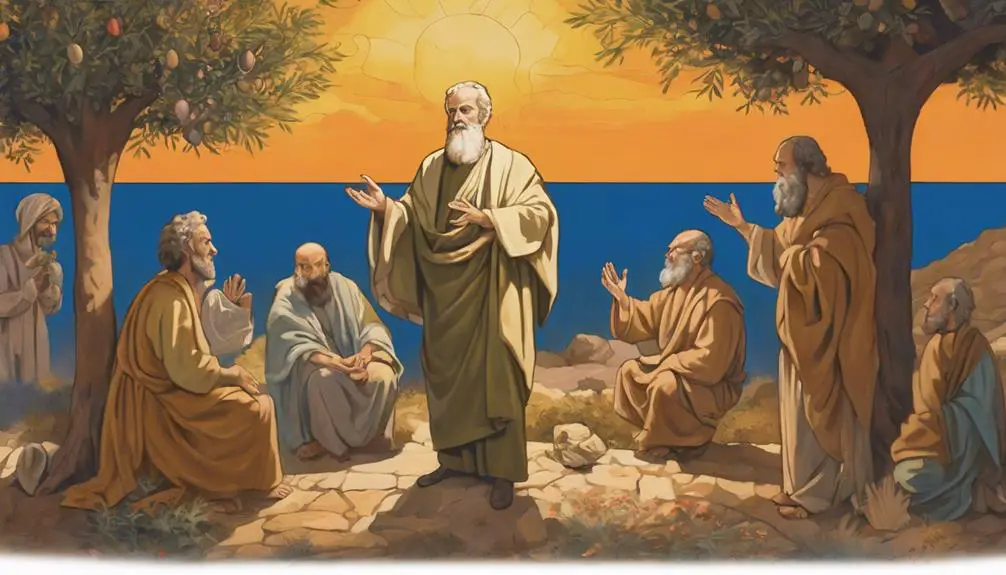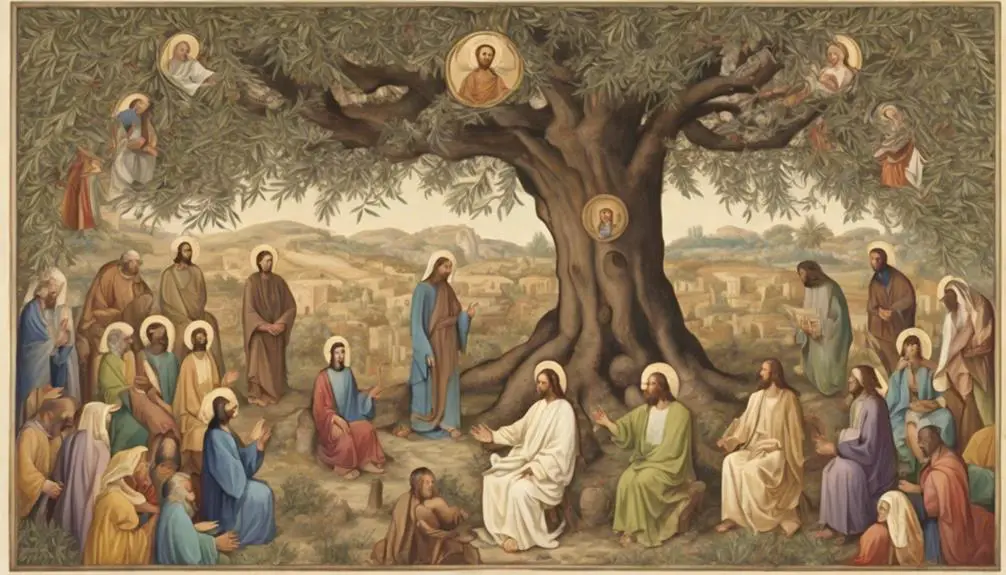Uncover the unexpected insights Acts 17:22-28 provides on understanding and engaging with other religions worldwide.

A Bible Verse About Other Religions
Did you know that over 4,300 religions exist in the world today? As you reflect on this surprising fact, consider the Bible verse Acts 17:22-28.
It's a fascinating account where Apostle Paul addresses the people of Athens, acknowledging their religiosity and using it as a starting point to introduce Christ. Now, how does this passage influence our understanding of, and interaction with, other faiths?
The answer may surprise you, providing a fresh perspective on interfaith dialogue.
Key Takeaways
- The Old Testament promotes monotheism and criticizes foreign religious practices as idolatrous.
- The New Testament, while focusing on salvation through Jesus, promotes love, tolerance, and understanding of other faiths.
- The 'First Commandment' underscores monotheism and God's supremacy, addressing the issue of religious pluralism.
- Both Jesus and Paul model respectful engagement with other religions, providing a blueprint for contemporary interfaith dialogue.
Old Testament Perspectives on Other Religions

The Old Testament provides a unique perspective on other religions, often viewed through the lens of Israel's historical and theological contexts. You'll find that it presents an exclusive monotheistic worldview, where Yahweh, the God of Israel, is seen as the only true God. It frequently criticizes and condemns the practices of foreign religions, depicting them as idolatrous and morally corrupt.
For instance, in the books of Kings and Chronicles, you see Israel's kings evaluated based on their adherence to Yahweh worship and their resistance to foreign religious influences. You also get to experience the prophetic literature, where prophets like Isaiah and Jeremiah denounce the worship of foreign gods, often linking it to social injustice.
Simultaneously, the Old Testament displays a deep concern for the ethical behavior of individuals and nations, regardless of their religious affiliation. The book of Jonah, for example, portrays the city of Nineveh, a non-Israelite entity, repenting and being spared by God.
New Testament Views on Non-Christian Faiths

Shifting our focus to the New Testament, we find a more inclusive stance towards non-Christian faiths. The teachings of Jesus Christ, particularly as recorded in the Gospel accounts, emphasize love, tolerance, and understanding. You'll notice an underlying theme of acceptance and coexistence, transcending religious boundaries.
Consider the parable of the Good Samaritan (Luke 10:25-37). The Samaritan, representing a faith community distinct from the Jewish majority, is portrayed as the hero, demonstrating the value of love and neighborliness above religious identity. This narrative breaks down walls of religious exclusivity, promoting universal moral values.
Moreover, Apostle Paul's approach towards non-Christian religions is characterized by respect and open-mindedness. In Acts 17, he engages with Athenian philosophers and even quotes their own poets to communicate the Gospel message. He doesn't reject their beliefs outright but rather uses them as a bridge for dialogue.
However, it's important to realize that while the New Testament showcases a more accommodating approach, it doesn't fully endorse other faiths. The essence of the Gospel is the unique salvation offered through Jesus Christ. Nevertheless, the New Testament does present a model of respectful interaction with those of differing beliefs.
Interpreting the "First Commandment

Delving into the interpretation of the 'First Commandment', you're confronted with a critical aspect of Biblical understanding that directly addresses the place of other religions. It states, 'You shall have no other gods before me' (Exodus 20:3). This commandment, ostensibly simple, carries profound implications when dissected.
On one hand, you may interpret this as a strict monotheistic assertion, suggesting a complete rejection of other deities and by extension, other religions. But on the other, it could also imply a hierarchical recognition of other gods, yet maintaining the supremacy of the God of Israel. Either way, it's clear that the first commandment directly grapples with the question of religious pluralism.
Additionally, the phrase 'before me' could be interpreted as a spatial reference, suggesting that God should occupy the foremost place in one's life. Alternatively, it could imply a temporal order, implying that no god should be worshipped prior to the God of Israel. This dichotomy in interpretation emphasizes the complexity within the Biblical texts and the importance of context when engaging with religious texts.
Paul's Encounter With Other Religions

Moving from the Old Testament into the New, we find noteworthy encounters with other religions in the experiences of Paul, a key figure in early Christianity. A prime example of this is his famous speech at the Areopagus in Athens, as documented in Acts 17:16-34. Here, you see Paul's approach to other religions – a combination of respect, understanding, and assertive proclamation of his faith.
Paul, standing amidst the Athenians' idols, doesn't outright condemn their beliefs. Instead, he carefully finds common ground, referencing their 'altar to an unknown god' before introducing them to the Christian concept of God. This approach demonstrates Paul's acknowledgement of the spiritual earnestness of the Athenians, even as he presents an alternative – the Gospel of Jesus Christ.
Paul's encounter with other religions offers a valuable lesson for contemporary interfaith dialogue. It suggests that the Christian faith, while holding its truth claims, can engage with other religions in a manner that's respectful and understanding, yet doesn't compromise on its core beliefs. This balance is crucial in fostering productive interfaith dialogue and promoting mutual understanding and respect among diverse religious communities.
Jesus and Interfaith Dialogue

While Paul's encounters provide valuable insights, it's equally important to examine Jesus' own practices in engaging with people of different faiths. The New Testament narratives depict Jesus in constant dialogue with various religious groups of his time. He wasn't averse to engaging in theological discussions with Pharisees, Sadducees, Samaritans, and Gentiles, demonstrating an openness to interfaith dialogue.
Pay close attention to Jesus' interactions with the Samaritan woman at the well (John 4:7-26). Despite the prevailing social and religious prejudices, Jesus broke barriers not only by conversing with a Samaritan but also by acknowledging her faith. He provided a theological critique, yet respected her religious experience, and revealed himself as the Messiah.
From this encounter, you can glean that Jesus wasn't dismissive of other faiths. He engaged in dialogue, challenged theological misconceptions, but also acknowledged truth wherever it was found. This approach can serve as a model for contemporary interfaith dialogue. You're reminded to respect the faith experiences of others while also presenting your own beliefs with clarity and conviction.
Conclusion
In conclusion, you've seen how both the Old and New Testaments regard non-Christian faiths. The 'First Commandment' isn't as exclusionary as it's often interpreted. Paul's encounters and Jesus' dialogues hint at a more inclusive perspective.
Thus, the Bible doesn't necessarily advocate for religious isolationism but rather encourages understanding and dialogue with other faiths. Such a reading can foster a more harmonious coexistence among diverse religions in today's multicultural society.



Sign up